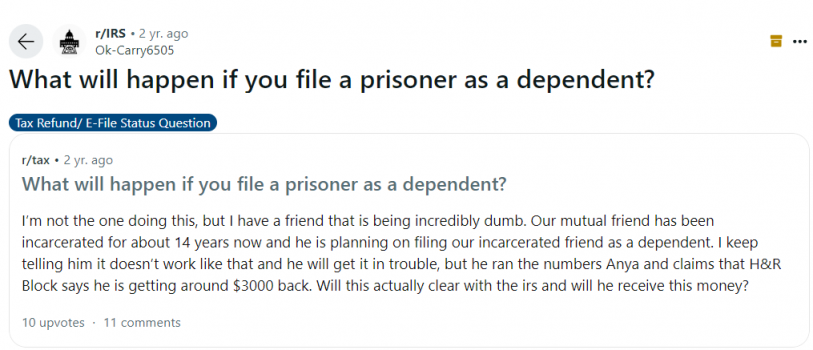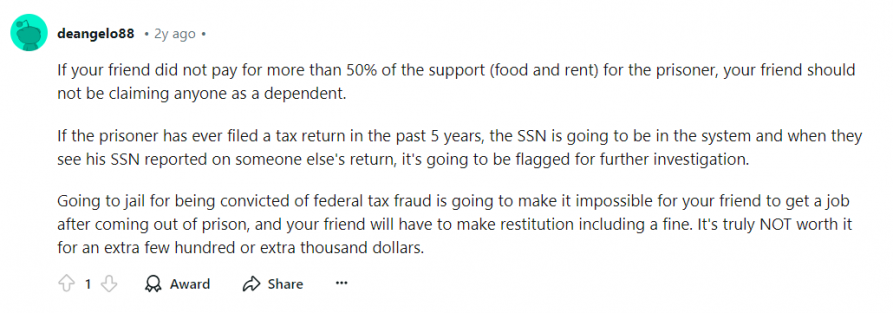
When someone is incarcerated, many of their responsibilities fall on loved ones or designated individuals, and that includes filing taxes. But can you file taxes for someone in jail? What are the steps, and are there any restrictions? This article explores everything you need to know about filing taxes on behalf of someone who is incarcerated, whether they’re your spouse, dependent, or a family member. We will also discuss how to manage tax debt if it comes into play, ensuring you don’t have to navigate the system alone.
Determine Your Filing Status
Before diving into the specific scenarios of filing taxes for someone in jail, it’s important to determine your filing status. This status affects what forms you use and your eligibility for tax deductions and credits. In the United States, the IRS recognizes several filing statuses:
- Single: You’re unmarried or legally separated.
- Married Filing Jointly: You file a combined tax return with your spouse.
- Married Filing Separately: You file your taxes separately from your spouse, but you’re still legally married.
- Head of Household: You’re unmarried and paid over half the cost of maintaining a home for yourself and a qualifying person.
- Qualifying Widow(er): You can file as this if your spouse passed away within the last two years and you have a dependent.
Understanding your filing status is crucial because it determines how you will proceed in filing taxes for someone in jail. Now, let’s explore how this works if your spouse or dependent is in jail.
If Your Partner Is In Jail
If you’re married and your spouse is in jail, you may wonder if you can file taxes on their behalf. The answer is yes, but it depends on your specific situation and your filing status.
Filing Jointly
If your spouse is in jail, you are still considered married in the eyes of the IRS, which means you can file a Married Filing Jointly return. This allows you to combine both of your incomes (if applicable) and enjoy tax benefits, such as higher income thresholds for certain tax credits. If your spouse earned any income before going to jail, you must report that income.
To file taxes jointly, your spouse will need to sign the tax return. If they are unable to do so, you can use a power of attorney to sign on their behalf. The IRS requires Form 2848 for this process, which grants you the authority to file taxes on their behalf.
Filing Separately
If you don’t want to file jointly, you can choose Married Filing Separately. This option is typically less beneficial tax-wise, as you miss out on several credits and deductions that are available to joint filers. It’s still a valid option, especially if you want to keep your finances separate from your incarcerated spouse’s taxes.
If Your Dependent Is In Jail
The situation becomes more complex when your dependent is in jail, as the IRS has specific guidelines for claiming dependents.
Claiming A Dependent In Jail
You can still claim a jailed child or qualifying dependent on your tax return under certain conditions. The IRS allows you to claim someone as a dependent if you provide more than half of their financial support for the year, and if they meet the qualifying relative or qualifying child criteria.
Here are some points to consider:
- Qualifying Child: Your child must be under 19 (or under 24 if a full-time student), or permanently and totally disabled, and must live with you for more than half of the year. Time spent in jail doesn’t necessarily count against the “living with you” requirement.
- Qualifying Relative: For dependents who don’t meet the “qualifying child” criteria, they may still qualify if their income is below a certain threshold and you provide the majority of their financial support.
However, once someone is convicted and serving time, their ability to meet these criteria can change, so it’s important to consult IRS guidelines or speak to a tax professional for your specific case.
Tax Return
Additionally, you cannot deduct any “charitable” contributions made to or on behalf of someone in jail. Money or expenses sent to an incarcerated individual are considered personal gifts by the IRS and aren’t tax-deductible.
How To File The Return
When filing taxes for someone in jail, you can e-file their return if you have their personal information (like their Social Security number and tax documents). However, some cases may require paper filing, especially if you’re filing with a power of attorney. Make sure to check with the IRS or a tax professional to ensure you’re following the correct procedure.
Do You Have Tax Debt?
If the incarcerated individual, whether a spouse or dependent, has existing tax debt, it’s important to address this immediately. Unpaid tax debt can lead to increased penalties, interest, and even wage garnishments or asset seizures.
Don’t worry! CuraDebt can help you with that. Take our free consultation to take control of that debt!
Handling Tax Debt While Incarcerated
Incarceration doesn’t eliminate tax debt. The IRS still expects payment, and failing to pay can result in serious consequences. However, there are several solutions available to help resolve tax debt:
- Installment Agreements: The IRS may allow you to set up a payment plan to pay off the tax debt over time.
- Offer in Compromise: The program lets you settle tax debt for less than the full amount if paying it all would cause financial hardship.
- Currently Not Collectible (CNC) Status: If the incarcerated individual has no ability to pay, they may qualify for CNC status, which temporarily halts IRS collection efforts.
Are you interested in learning more about the consequences of tax debt? Check this out!
If tax debt is a concern for you or your incarcerated family member, CuraDebt can help you navigate these options! We offer a free consultation to evaluate your situation and find the best solution for managing or settling tax debt.
Experiences And Questions From Real People
When searching through forums, you might find posts that address your specific questions. These communities are filled with real people sharing answers based on their own experiences, and you may find the information helpful for your situation as well. Let’s take a look!
Do People Have To Pay Taxes From Jail?

A user asks if you still have to pay taxes while in prison, and another forum member confirms the earlier point. The fact is, being incarcerated does not release someone from their tax obligations. The IRS still expects taxes to be filed and paid, just like for anyone outside of prison. Incarceration does not provide an exemption from these responsibilities, meaning that even individuals serving time must comply with tax laws, whether through personal filings or through someone else filing on their behalf.
What Will Happen If You File A Prisoner As A Dependent?


One user asks if it’s possible to claim a friend in prison as a dependent for financial reasons. Another user responds, explaining that it’s not worth the effort. When someone else asks if taxes still need to be paid while in prison, another forum member confirms the earlier point. The IRS’s criteria for dependents make it nearly impossible to justify claiming someone who is incarcerated. So, despite good intentions, trying to claim a friend in prison as a dependent could lead to complications and isn’t recommended.
Tax Avoidance Vs. Tax Evasion
Have you ever wondered what is the difference between tax avoidance and tax evasion? Find out here.
Conclusion
Filing taxes for someone in jail is possible, whether they are your spouse or dependent, but it’s important to follow the right procedures and understand the IRS’s requirements. From determining your filing status to handling tax debt, navigating the tax system for an incarcerated individual can feel overwhelming. Fortunately, help is available.
If you or someone you know is dealing with tax debt, CuraDebt is here to assist you. Contact us today for a free consultation and explore your options for resolving tax debt. We’re here to make the process easier, so you can focus on supporting your loved ones.
